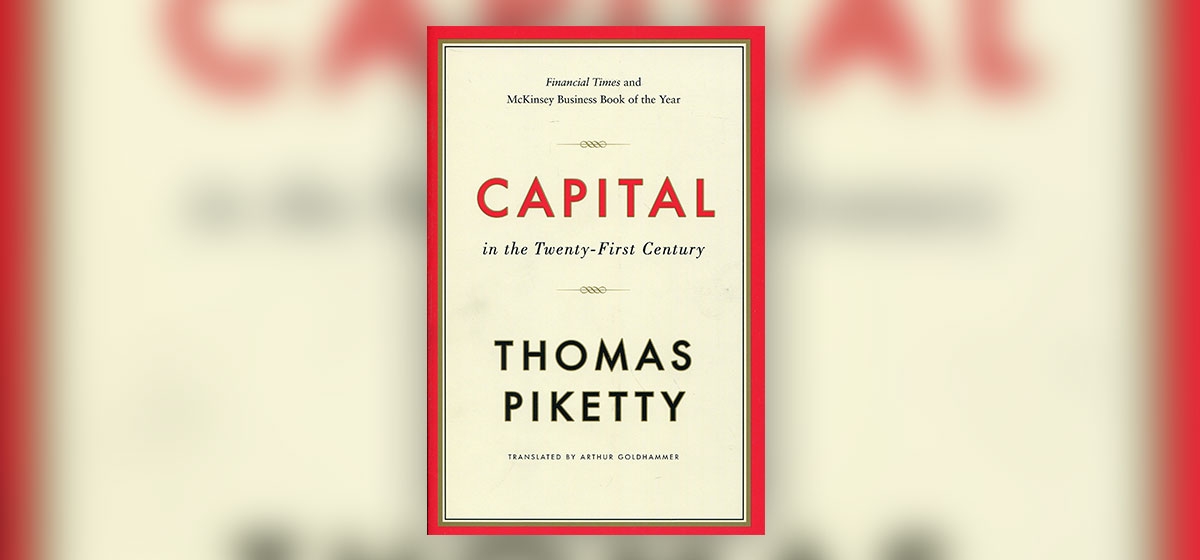The Trouble with “Capital”

In the summer of 2013 a remarkable event occurred in the publishing industry. A challenging, 685-page economic text written by an obscure French economist and published by an academic press became an overnight best seller.
Thomas Piketty’s “Capital in the Twenty-First Century” (referred to here simply as “Capital”) sold so quickly that Harvard University Press couldn’t keep up with the demand and was forced to outsource to printing presses in England and even India. The book basked on the New York Times bestseller list for 22 weeks and, last I looked, more than 500,000 copies were in print in English alone. What could possibly account for such a phenomenon?
Piketty’s book proved to be such a success because, like a few other recent books (one thinks of “Hillbilly Elegy,” for example, about which I’ll have something to say anon) it captured the zeitgeist-of-the-moment. Piketty argued, in a nutshell, that in a capitalist society the rich will get forever richer, leaving everyone else behind.
A glowing review by Paul Krugman fed the mania. Here, after all, was a sound economist (I mean Piketty, not Krugman), who had done a lot of very serious research, essentially proposing that Marx was right after all! (Piketty’s title, we could hardly fail to notice, intentionally referred back to “Das Kapital.”) For those folks with a dismal opinion of free market economies, “Capital” was manna from heaven.
Alas, the enthusiasm was soon to fade. But before I get to the reasons why Piketty continues to be a darling only among leftwing university economics departments (I think there are four redundancies in that phrase), let’s summarize what he argued in his 685 pages.
Piketty’s thesis on private wealth is simplicity itself. He claims, based on his research, that over the long term the return on capital (“r”) is higher than the broad growth rate of economies (“g”). Thus, the “central contradiction of capitalism,” as Piketty put it, is that the rich will forever get richer while everyone else falls by the wayside. But, interesting though Piketty’s idea is, there are many, many problems with it.
The first problem is his research itself. The ink was no sooner dry on “Capital” than scholars everywhere began to find serious flaws in Piketty’s data. I won’t go into detail, but the flaws were serious enough that the Financial Times, which might have been expected to be sympathetic to Piketty’s idea, concluded that, “there is little evidence… to bear out the thesis than an increasing share of total wealth is held by the richest few.”
The second issue with “Capital,” which seemed not to dawn on anyone for a while, was that Piketty was addressing the wrong problem. Inequality had certainly grown in the U.S. and, indeed, in all the developed market economies. But what had caused all the trouble (Brexit, Trump, etc.) wasn’t wealth inequality, it was income inequality.
If the inequality of wealth had been exactly what it is today, but if income inequality had been no worse than it was three or four decades ago, then inequality wouldn’t be a big issue. After all, wealth inequality typically arises, at least initially, because somebody has done something remarkable, something that society badly wanted and was willing to pay for. People don’t begrudge that wealth.
Income inequality, on the other hand, affects people’s daily lives, their ability to support their families, their hopes and dreams for their children. Allow the incomes of half of all American families to stagnate, while the top quarter flourishes, and you will have a problem. Why didn’t Piketty write a book on income equality? My guess? Piketty knows perfectly well that income inequality has soared in recent decades—he himself (along with two U.S. collaborators) has been in the forefront of documenting the problem.
But if “Capital” had focused on income inequality, the villains of the piece would have been the very liberal, coastal elites whose incomes have soared over the past 30 years and who have evidenced not the slightest concern for the plight of everyone else. These elites are precisely the people who are Piketty’s biggest fans. Hmm…
The third big problem with “Capital” is that Piketty’s famous equation (r > g) has nothing whatever to do with a free market form of economic organization. If it is correct, it applies to all economies of every kind everywhere.
One final problem I’ll mention before I get to the heart of this series of posts is that Piketty had no solution to the problem he claimed to have discovered. More specifically, his proposed solution was hair-brained. He demanded a global tax on wealth—that is, a tax that would be levied by every country in the world, to keep the rich from migrating. The tax would be imposed every year.
There is pie in the sky, and then there is Pie in the Sky, and this wacko idea was the latter. Only a few autocratic countries—Cuba, North Korea, Venezuela—can even be imagined imposing such a tax, and those countries don’t have any private capital anyway. In fact, the largest economy in the world (the U.S.) and Piketty’s home country (France) recently reduced wealth taxes.
My main point about “Capital,” however interesting its thesis, is analogous to, and proceeds from the same defects, as the silliness of Piketty’s proposed solution. The global wealth tax is the best idea Piketty can come up with not because he’s stupid, or even because he is blinded by his own leftwing ideology. Piketty’s book is, in fact, interesting and engaging (and quite fluently translated), and Piketty is, based on his work before “Capital,” an economist of the first importance.
No, the problem with “Capital” throughout is that its author is a naif. However astute Piketty might be at the field of economics, however diligent his research, however honorable his motives, he has little or no grasp of how the real world actually works. This is true of many people who spend their lives in university settings, of course, but Thomas Piketty has contracted a particularly virulent form of the disease. I’ll get to that issue next week.
Next up: On r > g, Part II





